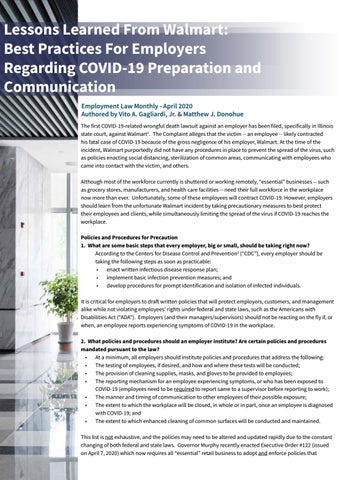52
Lessons Learned From Walmart: Best Practices For Employers Regarding COVID-19 Preparation and Communication Employment Law Monthly - April 2020 Authored by Vito A. Gagliardi, Jr. & Matthew J. Donohue The first COVID-19-related wrongful death lawsuit against an employer has been filed, specifically in Illinois state court, against Walmart1. The Complaint alleges that the victim -- an employee -- likely contracted his fatal case of COVID-19 because of the gross negligence of his employer, Walmart. At the time of the incident, Walmart purportedly did not have any procedures in place to prevent the spread of the virus, such as policies enacting social distancing, sterilization of common areas, communicating with employees who came into contact with the victim, and others. Although most of the workforce currently is shuttered or working remotely, “essential” businesses -- such as grocery stores, manufacturers, and health care facilities -- need their full workforce in the workplace now more than ever. Unfortunately, some of these employees will contract COVID-19. However, employers should learn from the unfortunate Walmart incident by taking precautionary measures to best protect their employees and clients, while simultaneously limiting the spread of the virus if COVID-19 reaches the workplace. Policies and Procedures for Precaution 1. What are some basic steps that every employer, big or small, should be taking right now? According to the Centers for Disease Control and Prevention2 (“CDC”), every employer should be taking the following steps as soon as practicable: • enact written infectious disease response plan; • implement basic infection prevention measures; and • develop procedures for prompt identification and isolation of infected individuals. It is critical for employers to draft written policies that will protect employers, customers, and management alike while not violating employees’ rights under federal and state laws, such as the Americans with Disabilities Act (“ADA”). Employers (and their managers/supervisors) should not be reacting on the fly if, or when, an employee reports experiencing symptoms of COVID-19 in the workplace. 2. What policies and procedures should an employer institute? Are certain policies and procedures mandated pursuant to the law? • At a minimum, all employers should institute policies and procedures that address the following: • The testing of employees, if desired, and how and where these tests will be conducted; • The provision of cleaning supplies, masks, and gloves to be provided to employees; • The reporting mechanism for an employee experiencing symptoms, or who has been exposed to COVID-19 (employees need to be required to report same to a supervisor before reporting to work); • The manner and timing of communication to other employees of their possible exposure; • The extent to which the workplace will be closed, in whole or in part, once an employee is diagnosed with COVID-19; and • The extent to which enhanced cleaning of common surfaces will be conducted and maintained. This list is not exhaustive, and the policies may need to be altered and updated rapidly due to the constant changing of both federal and state laws. Governor Murphy recently enacted Executive Order #122 (issued on April 7, 2020) which now requires all “essential” retail business to adopt and enforce policies that

















